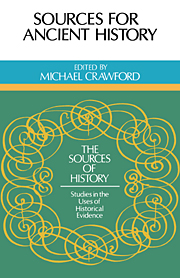Introduction
Published online by Cambridge University Press: 06 January 2010
Summary
If a scholar wishes to create a picture of a modern society in all its aspects, there is little of what he needs to know that he cannot find out, although there may still be much that he cannot understand. For the history of Greece and Rome, there is a great deal which is simply unknowable.
Towards the end of the Archaic age of Greece, there developed the writing of works of history which are recognisably the ancestors of those written today; from this point on there is an unbroken sequence of works by Greek and, later, Roman historians down to the end of antiquity. The investigation and characterisation of this historiographical tradition is among the first tasks which face a modern historian of the ancient world. But only a tiny part of what once existed survived the wreck of that world; in addition, the range of interest of historians in antiquity was rather narrow and it was limited, with a few exceptions, to political history; even where their interest was wider, they took for granted much that we wish to know, on economic conditions and even on political institutions. Moreover, there was a general tendency to explain all human actions largely in moral terms.
Much may, of course, also be learned from literary works besides the historical – epic poetry, tragic or comic plays, speeches, philosophical treatises, personal poetry; but many of these works are, like histories, the product of a restricted social class and share its limited vision, although they may also be unconsciously revealing of its assumptions and preconceptions.
- Type
- Chapter
- Information
- Sources for Ancient History , pp. ix - xiiPublisher: Cambridge University PressPrint publication year: 1983

